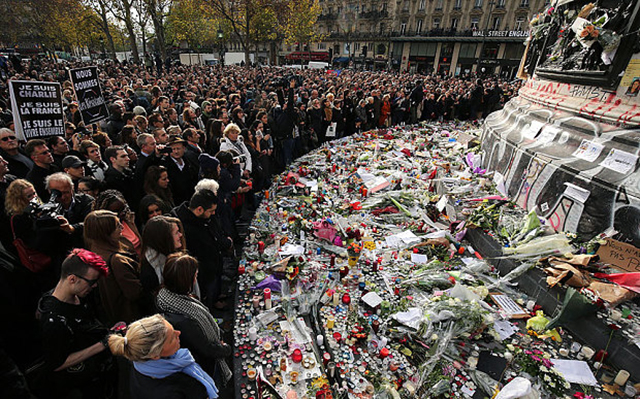Reports say that a wave of coordinated attacks left more than 128 dead and 180 wounded in scenes of carnage in Paris on late Friday – the incident is said to be the bloodiest in Europe since the Madrid train bombings in 2004. The attackers struck at least six very different venues, ranging from the national sports stadium to a pizzeria.
The casualties eclipsed the deaths and mayhem in Paris during the massacre at the Charlie Hebdo newspaper and related assaults around the French capital by terrorists less than a year ago.
The multiple attacks across the city late Friday were “an act of war...committed by a terrorist army, the Islamic State, against France, against...what we are, a free country,” French President Francois Hollande is quoted as saying.
In spite of exerting strict law vis-à-vis terrorism – mainly following the attack at Charlie Hebdo – France suffers the brunt of terrorist assaults in Europe. France established a special court for prosecuting the criminals involved in terrorism and applies harsh rule in this regard. For instance, a person suspect of terror arms will be held under police investigation, within 48 hours or so without access to attorney whereas one accused of other crimes will be held no more than 24 hours. Moreover, it is legally allowed to hold a terrorist suspect in detention for two years during the interrogation while the maximum time for investigating a simple suspect is four months.
Despite the mentioned facts, France is the sacrificial lamb in Europe as Afghanistan is the very victim of terrorism in Asia. It is self-explanatory that terrorism and militancy are the crux of the challenges in Afghanistan. Previously, the Taliban insurgents made inroads in the country under a single leadership; however, now the splinter group has aggravated the issue. After all, the emergence of the self-styled Islamic State (IS) group has left the Afghan nation at the mercy of greater sacrifices and posed a new challenge to the government. The graph of civilian casualties rises in the country with the passage of time. One’s blood is shed and his/her dignity is disrespected on the grounds of their cast, creed or religion. In another item, the noncombatants have been made scapegoats in Afghanistan – the same as in France.
Based on a source, Afghan government has also come to a decision to implement severe law regarding criminals/suspects involved in terrorism. A particular court is determined for their prosecution in Parwan province by the President’s mandate. Unlike general investigation, a suspect of terrorist issue will be held under interrogation for 10 days without access to attorney and he/she will be held in detention center for a year, which is also extendable, for keeping preventing measures.
Actually, multiple definitions have been given over terrorism: “A policy intended to strike with terror those against whom it is adopted; the employment of methods of intimidation; the fact of terrorizing or condition of being terrorized.” Based on second definition, terrorist is “Anyone who attempts to further his views by a system of coercive intimidation”. This definition underscores clearly the other fundamental characteristic of terrorism: that it is a planned, calculated, and indeed systematic act.
We may therefore now attempt to define terrorism as the deliberate creation and exploitation of fear through violence or the threat of violence in the pursuit of political change. All terrorist acts involve violence or the threat of violence. Terrorism is specifically designed to have far-reaching psychological effects beyond the immediate victim or object of the terrorist attack. It is meant to instill fear within, and thereby intimidate, a wider ‘target audience’ that might include a rival ethnic or religious group, an entire country, a national government or political party, or public opinion in general. Terrorism is designed to create power where there is none or to consolidate power where there is very little.
Formerly, terrorism did not have a far-reaching aspect rather it was restricted within a limit of political power used by politicians against one another. However, in modern terrorism, people were changed to scapegoat or used as a tool for gaining interests.
Since the militant extremists are mostly the religious ideologues, enforcing severe law failed to curb terrorism in France. Similarly, negotiation was also proved abortive as Afghan officials did their best within the last decade to bring in peace through reconciliation process.
In a nutshell, the foundation of High Peace Council in 2010, which was tasked to bring the Taliban to the table of negotiation, was in vain. Will exerting strict law, such as France, bear the desired result in Afghanistan?
This mechanism is unlikely to stop terrorism. The 2007 bomb blasts in the UK prompted the International Association of Chiefs of Police to come up with techniques to prevent the suicide bomber from reaching his target. “The solution recommended was shooting the suspected bomber in the head. The technique holds out hope for those countries where absolutely no mechanism is in place to stop the living bomb from creating mayhem.”
Israel has been able to foil 80 percent of suicide operations through counter-intelligence. Other countries like Afghanistan have to enhance the capacity of their intelligence agencies in order to disrupt the network that organizes and supports such actions. Moreover, both the countries must intensify security in their borderlines to prevent the militants’ infiltration.

